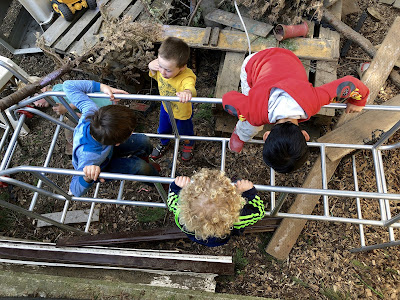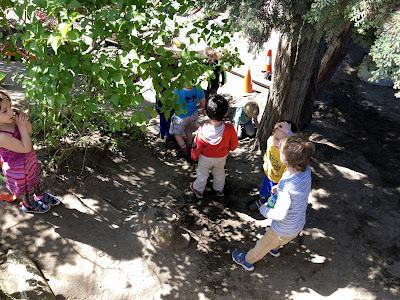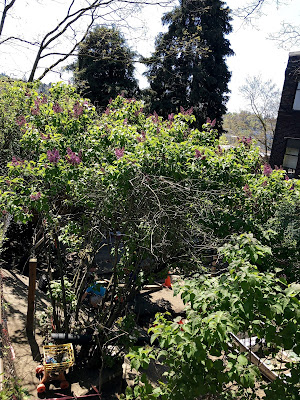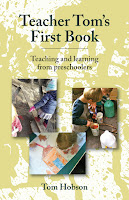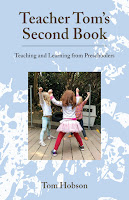We've made rules in our classroom, together, by consensus, and among the first agreements we made with one another was, "No taking things from other people," an echo of the Biblical commandment to not steal. There are anthropologists who argue that prior to the advent of the Agricultural Revolution around 10,000 BC there was no such thing as "stealing" because there was no such thing as property, but, I expect, the urge to snatch some rare or special thing from the hands of another, if only to take a closer look, was still an urge with which our hunter-gatherer ancestors needed to deal. And that's really what we're usually talking about in preschool. Stealing implies taking something with the intention of illicitly and selfishly transferring ownership while snatching falls more into the category of uncontrollable curiosity.
Whatever the case, in our modern world these two distinct urges get lumped together, especially in the minds of young children who, through their play, are forever attempting to tease out both personal and social meaning. Yesterday, a group of boys were huddled together in a corner of the playground they have "built" for themselves.
"Guys, guys, I got a plan. We need to take those jewels."
"What jewels?"
"Those guys, over there, they have a bucket of treasure and we need it for our team."
They were referring to their friends, boys with whom they often play, but who were on this day playing separately. They had spent the past half hour or so collecting small shiny objects in a bucket. They were bits and bobs that anyone can pick up from the ground around our place -- florist marbles, beads, pieces of toy jewelry -- but they had named it "treasure" and now it was this treasure that these other boys were scheming to make their own.
There were a few moments of intense conversation, quiet, secretive. I couldn't hear their words, but their intentions were clear: they were planning an incursion to wrest control of that bucket, which they were going to hide and hoard somewhere in their hideout. Before long they attacked running toward the boys with the treasure, whooping, making fierce faces, wielding sticks like weapons.
The boys with the treasure looked confused at first, backing away a bit.
"We're going to take your treasure!"
"No, you're not! It's our treasure!"
The moment was tense as the two sides stood face to face. These guys have often played fighting games together, but I know these children, I've taught most of them for three years. Physical violence wasn't in the offing even as their bodies, tense and aggressively posed, seemed to indicate it. It was a moment both real and pretend, this stand-off above the sand pit. I recall moments like this from my own childhood. I knew their hearts were racing. I know that some of them at least were feeling that they were now in over their heads, that they didn't really want to "steal," but just to snatch, to see and feel and hold the treasure that these other boys had made from debris that had always been there.
It lasted a few seconds as everyone stood posed, then one of the attackers dropped to his knees, dropping out, and began running his fingers through the sand. Then one of the defenders backed away, turning his back. One by one by one I saw their shoulders drop as the tension left their bodies, leaving only two boys still standing in opposition to one another, while the others milled around no longer part of the game.
"We're using this treasure!" the defender said forcefully. "You can use it when we're finished!"
"Okay!" his friend answered from under his glowering brow as if making a threat, "We will!"
And then it was over, the aspiring robbers returning to their base, apparently satisfied with waiting for their booty and the treasure collectors once more scouring the ground for sparkling items to add to their cache.
Whatever the case, in our modern world these two distinct urges get lumped together, especially in the minds of young children who, through their play, are forever attempting to tease out both personal and social meaning. Yesterday, a group of boys were huddled together in a corner of the playground they have "built" for themselves.
"Guys, guys, I got a plan. We need to take those jewels."
"What jewels?"
"Those guys, over there, they have a bucket of treasure and we need it for our team."
They were referring to their friends, boys with whom they often play, but who were on this day playing separately. They had spent the past half hour or so collecting small shiny objects in a bucket. They were bits and bobs that anyone can pick up from the ground around our place -- florist marbles, beads, pieces of toy jewelry -- but they had named it "treasure" and now it was this treasure that these other boys were scheming to make their own.
There were a few moments of intense conversation, quiet, secretive. I couldn't hear their words, but their intentions were clear: they were planning an incursion to wrest control of that bucket, which they were going to hide and hoard somewhere in their hideout. Before long they attacked running toward the boys with the treasure, whooping, making fierce faces, wielding sticks like weapons.
The boys with the treasure looked confused at first, backing away a bit.
"We're going to take your treasure!"
"No, you're not! It's our treasure!"
The moment was tense as the two sides stood face to face. These guys have often played fighting games together, but I know these children, I've taught most of them for three years. Physical violence wasn't in the offing even as their bodies, tense and aggressively posed, seemed to indicate it. It was a moment both real and pretend, this stand-off above the sand pit. I recall moments like this from my own childhood. I knew their hearts were racing. I know that some of them at least were feeling that they were now in over their heads, that they didn't really want to "steal," but just to snatch, to see and feel and hold the treasure that these other boys had made from debris that had always been there.
It lasted a few seconds as everyone stood posed, then one of the attackers dropped to his knees, dropping out, and began running his fingers through the sand. Then one of the defenders backed away, turning his back. One by one by one I saw their shoulders drop as the tension left their bodies, leaving only two boys still standing in opposition to one another, while the others milled around no longer part of the game.
"We're using this treasure!" the defender said forcefully. "You can use it when we're finished!"
"Okay!" his friend answered from under his glowering brow as if making a threat, "We will!"
And then it was over, the aspiring robbers returning to their base, apparently satisfied with waiting for their booty and the treasure collectors once more scouring the ground for sparkling items to add to their cache.
******
If you like what you read here, you might enjoy one, or both, of my books. Click here!
I put a lot of time and effort into this blog. If you'd like to support me please consider a small contribution to the cause. Thank you!




